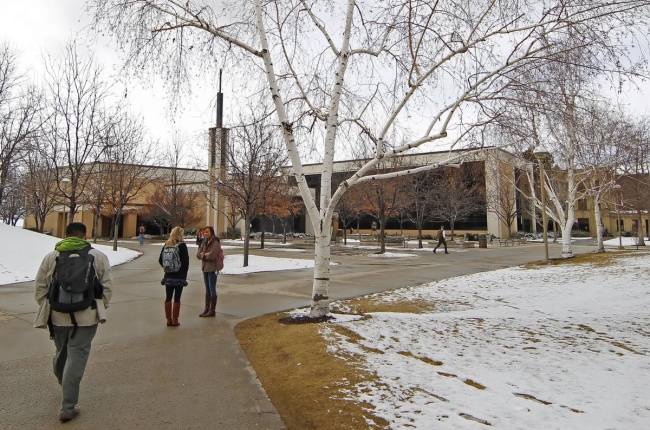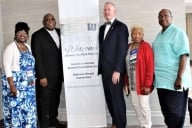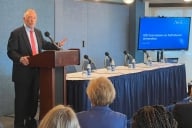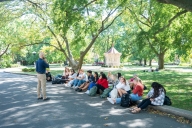You have /5 articles left.
Sign up for a free account or log in.

Brigham Young University campus
Getty Images via George Frey
Brigham Young University's recent removal of “homosexual behavior” as a prohibited and punishable act under its honor code has caused both celebration and skepticism in the LGBTQ community.
On the surface, the removal of a passage in the honor code on Feb. 19 indicates that members of the university who display such physical intimacy will no longer be subjected to disciplinary measures, including removal from the university, which is owned by the Church of Jesus Christ of Latter-day Saints. But in a series of tweets the next day, university representatives said “there may have been some miscommunication” about what the changes mean.
“We have removed the more prescriptive language and kept the focus on the principles of the honor code, which have not changed,” said Carri Jenkins, assistant to the president for university communications. “We will handle questions that arise on an individual, case-by-case basis.”
The response has left many LGBTQ students enrolled at the Utah institution in the dark about how they can express their sexual orientation, since the university did not make it explicitly clear.
Before Wednesday's changes, the university said it would act on "behavior" rather than "feelings or attraction." The now-deleted paragraphs state that homosexual behavior, which "includes not only sexual relations between members of the same sex, but all forms of physical intimacy that give expression to homosexual feelings" is in violation of the honor code.
A spokeswoman for the university declined to explain what the revision will mean for LGBTQ couples who kiss, hug, hold hands, date or otherwise express their sexual orientation in public.
“Students are free to go to the Honor Code Office to get clarification if that affects them,” she said.
Some students did just that and learned physical intimacy between LGBTQ people is permitted, “as long as it’s not serious and leads to marriage,” said Martha Harris, a junior who is a lesbian. Multiple students shared similar stories on Twitter.
"Now I think it’s just very unclear what could happen," Harris said. "I know people who have gotten kicked out, people who have been reported to the office for rumors of hugging or coming out … I’m still trying to figure it out. I’m waiting a few days to see where things lay, because of the very conflicting messages."
McKay Boyack, a senior at Brigham Young who is a lesbian, said the “principle-based approach” the university will now take on LGBTQ sexuality is more subjective than the passage it removed, which is concerning.
“I’m so excited I could cry, but I’m really scared that they’re going to draw back on that before we have the chance to do anything,” Boyack said. “Who’s to say that one honor code officer wouldn’t be like, ‘it’s fine for them to date,’ and another wouldn’t throw you out of the school? It’s giving us more ambiguity as students that we already deal with in the church.”
The language change occurred immediately after the Church of Jesus Christ of Latter-day Saints released its updated general handbook, which outlines the church's mission and goals. The new handbook eased disciplinary measures for same-sex couples, but it continues to state that same-sex sexual activity is a sin and that gender is defined at birth, The Salt Lake Tribune reported. In addition to its removal of the behavior passage, the university expanded a section at the beginning of the Honor Code to define a “chaste and virtuous life” as “abstaining from any sexual relations outside a marriage between a man and a woman,” according to the Tribune.
While removing the “homosexual behavior” passage from the Honor Code is a step in the right direction, the university has not implemented any nondiscrimination policies to protect LGBTQ students from bullying or harassment, said Paul Castillo, counsel and students’ rights strategist for Lambda Legal, a national organization focused on protecting the legal and civil rights of LGBTQ people. The burning question about the policy is what it will mean in practice, Castillo said.
“What does this mean for students who come out and are seeking to be supported by their peers, by school administrators, and what does that support look like?” Castillo said. “It’s one thing to remove language that targets LGBTQ students, but a whole different thing to show a wholesale commitment to the safety and well-being of all students.”
Culture changes take time, said Harris, who has been “selective” about whom she tells about her sexuality. She said when she first arrived at the campus, it was clear to her that she “wasn’t the type of person that [BYU] wanted.”
She questioned whether the university changed the Honor Code simply to improve its public image.
"I do fear it’s pressure from outside sources," Harris said. "Organizations not wanting to work with BYU, people from the outside thinking that’s a very toxic and homophobic school. I’m a little scared it’s for PR."
Bradley Talbot, a junior who runs an LGBTQ awareness and support organization called Color The Campus, said he received threats to report him to the Honor Code Office when people learned that he was gay and was running the once-anonymous organization. He's now hopeful that the changes to the code will allow students to be open about their sexual orientation.
“I do feel like I can talk more openly about my dating life and what I hope to do in the future and not have to wait until I graduate to tell anyone,” Talbot said. “Dating has been going on for a while, just no one could talk about it. Because it was so secret, it put a lot of people into compromising situations and led to sexual harassment and rape. Now people can be more open … without fear of being disciplined on a scholarly level.”
Student opposition to the changes has been brewing, LGBTQ students said. Across campus, people have been posting copies of “The Family: A Proclamation to the World,” a church document that affirms “marriage between man and woman is essential to His eternal plan” and warns against “those who fail to fulfill family responsibilities.”
Seventy percent of members of the church support nondiscrimination protections for LGBTQ people in housing, public accommodations and the workplace, a 2019 survey by the Public Religion Research Institute found.
“There is very strong support for nondiscrimination policies,” said Sharita Gruberg, policy director for the LGBT research and communications project for the Center for American Progress.
Talbot said he believes the church is “becoming more understanding and recognizing” of LGBTQ issues.
“Even though we hold truths and doctrines about the family as what the standard is, there’s no such thing as a perfect family and things are going to get messy,” Talbot said. “It’s not as black-and-white as it once was … We might need a little more time for things to work out.”








